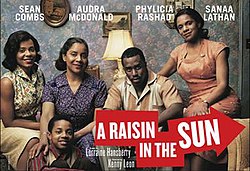Plot
In 1959 Chicago, the Younger family is expecting a life insurance check of $10,000 after the death of Walter Lee’s father. Walter Lee, an impoverished limousine driver, wants to invest the money in a liquor store with his partner Bobo, hoping that it will put an end to his wife Ruth and son Travis' financial troubles while his sister Beneatha, who had recently accepted a date with a prosperous neighbor, George Murchinson, intends to use it to pay her medical school tuition. Lena, the mother of Walter Lee, who had just quit her job, would rather spend it on a house she and her deceased husband Walter Lee Sr. "Big Walter" dreamed of.
At the Green Hat club, Walter Lee and Bobo discuss opening their liquor store when Willy Harris, a friend, chips in by telling them how they can get a business license from people in Springfield and that they could move the business near the Green Hat, with Walter Lee and Bobo agreeing. The next day, Beneatha and Lena discover that Ruth has been pregnant for two months, with Ruth fearing for their financial issues as the new child would add to them. Beneatha invites Joseph over, who gives her some Nigerian music and a wrapper and an invite to dinner on Monday. Thinking that he has feelings for her, Beneatha scorns him. Later on, the check arrives, to Beneatha, Lena, Ruth, and Travis' joy, only for that joy to end when Walter Lee tells Lena about his future liquor business, much to Lena's dismay, who informs him of Ruth being pregnant and planning to get an abortion. Although Lena is against abortion, Walter Lee voices no objection to it.
Later that night, Beneatha dresses Nigerian for a date with George Murchinson. George calls her out for being "eccentric" and boasts about how her heritage means nothing, when Walter Lee comes in, noticing George and rants about how he has it made. Just then, Lena comes in, telling them that she spent the money on a house in Clybourne Park, to everyone's joy except for Walter.
The next day, Lena receives a call from Mrs. Arnold, the wife of Walter Lee's employer about him missing work, prompting Lena to find him. Lena finds Walter Lee at the Green Hat, and he reluctantly returns. Meanwhile, Ruth tries to get an abortion with help from Miss Tilly, who works at a salon. Discovering how the process works, Ruth changes her mind and leaves. At a café, Lena reveals to Walter Lee that she spent $3,500 for the house, leaving Walter Lee with $6,500. She tells Walter to deposit $3,000 for Beneatha's tuition and take the remain $3,500 for himself.
The next day, the Youngers explore the new house, much to their white neighbors' disgust. A man from the Clybourne Park Improvement Association named Karl Lindner arrives to offer the Youngers money in return for staying away, but they refuse the deal. Just then, Bobo arrives and has a private talk with Walter Lee, revealing that he gave all of the money to Willy and that Willy never showed up at the train station. Walter comes back in, revealing that all the money is gone, to everyone's shock.
Later, Joseph arrives and consoles Beneatha, which she and the rest of the Youngers are back at the apartment. As Ruth tries to persuade a now hopeless Lena that they can still afford the house, Walter arrives, explaining how life is divided between "the takers and the tooken," which is why he made a call to Karl so he can receive more money from him for the house. When Lindner arrives to sign the papers, Walter Lee has a change of heart and calls off the deal, telling him that they will move into the house. The Youngers get ready to move into their new home.
Critical reception
In his review in Variety , Dennis Harvey said, "Strong performances and a brisk pace downplay the original script's more dated, preachy aspects. No one will mistake this well-produced but inevitably dialogue-driven piece for pure cinema, but Leon and adapter Paris Qualles open up the play just enough to avoid the usual stage-to-screen claustrophobia. Mervyn Warren's score is a bit more earnest and old-fashioned than would be ideal for this essentially faithful yet refreshed take on a dramatic golden oldie." [3]
James Greenberg of The Hollywood Reporter said, "A Raisin in the Sun never totally transcends its origins on the stage and it's a long way from cutting edge cinema. But those who can relax into the leisurely pace and lush language will be rewarded with an earnest and moving night at the movies. As he did on stage, Leon gets the most out of his actors and with Hansberry's words, that's what carries the film. Rashad beautifully captures the wounded pride and hopes of the older generation, while the rapper and music entrepreneur Combs holds his own in his first major movie role. Balanced between her mother-in-law's idealism and her husband's pragmatism is Walter's wife Ruth, who may be getting the worst of both worlds. McDonald gives the role a heartbreaking dimension." [4]
In The Wall Street Journal , Drothy Rabinowitz observed the three-hour production "flies by with lightning speed - and that cast led by Ms. Rashad as Lena, is no small part of the reason. Ms. McDonald is heartbreaking as Ruth, desperate to understand her husband's descent into misery, and Mr. Combs, who portrays that husband, delivers a sterling performance." [5]
Joanne Ostrow of the Denver Post said, "Overall, this Raisin is a proud, important addition to the history of stage adaptations for TV, one that could touch many more millions of people than ever saw the play, thanks both to its star power and the reach of the medium." [6]
In Entertainment Weekly , Ken Tucker rated the production B+ and called it "a model of subtle adaptation." [7]
